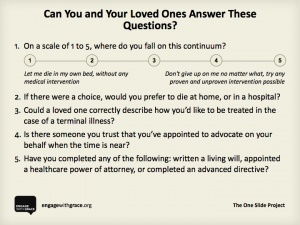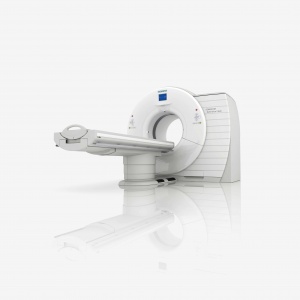November 26th, 2008 by Dr. Val Jones in Announcements
4 Comments »
Matthew Holt and Paul Levy have encouraged medical bloggers to join together around a common goal for Thanksgiving: to talk to our loved ones about end-of-life preferences. Now I know this may seem a bit morbid at first blush – but it is really important that each of us create a living will and durable power of attorney document. There’s no better time to discuss this than a holiday where we all get together with our families to enjoy one anothers’ company and our gratitude for what we have.
I used the Suze Orman site templates to create mine (I received a free CD Rom). It was really easy to do. Living Wills provide guidelines about your wishes for care in the event that you are unable to express your opinions. The Durable Power of Attorney document makes it clear whom you’d like to “call the shots” on your care if you’re unable to do so for yourself.
If you haven’t done so already, why not consider the following three steps over Thanksgiving?
1. Discuss the “Engage with Grace” slide with your loved ones.
2. Fill out living will and power of attorney documents at Suze’s site (or find another site online that has a good template that you can use to express your wishes).
3. Get those documents affirmed by a notary public and send a copy to your doctor to add them to your medical record.
Every person at every age needs to have an end-of-life care plan. Why not join with thousands of blog readers in settling this matter for yourself and your loved ones this Thanksgiving?

November 25th, 2008 by Dr. Val Jones in Audio, Expert Interviews
7 Comments »

Photo Credit: authenticmaya.com
The blogosphere has been buzzing lately about the idea of “fecal transplants,” probably because this treatment (first studied in the 80’s) was recently mentioned on Grey’s Anatomy. Proponents of the therapy (which involves the introduction of donor stool into a patient via enema or naso-gastric tube) say that it can rejuvenate intestinal flora and cure c. diff colitis, and various inflammatory bowel disorders. I had my doubts about these claims and decided to interview gastroenterologist Dr. Brian Fennerty to get to the bottom (sorry abou the bad pun) of this issue.
Dr. Fennerty is a Professor of Medicine in the Division of Gastroenterology at Oregon Health & Science University in Portland, Oregon, where he also serves as Section Chief of Gastroenterology.
Listen to the podcast here:
[Audio:http://blog.getbetterhealth.com/wp-content/uploads/2008/11/brianfennertyfecallq.mp3]
Dr. Val: What exactly is a “fecal transplant?”
Dr. Fennerty: First, by way of background, you need to understand that the GI tract is populated with thousands of varieties of “good” bacteria that are essential for our health. If we didn’t have bacteria in our colon and small intestine, we would die. Fecal transplantation is the repopulation of a person’s gut bacteria (flora) with fecal matter from somebody else. Some argue that this helps to treat certain diseases.
Dr. Val: How is this procedure performed?
Dr. Fennerty: As it was originally described, fecal transplantation involved removing the undigested food particles from the stool sample of a “healthy” person, and then spinning it so that a pellet (of hundreds of thousands of species and quasi-species of bacteria) remains. The pellet is then introduced to the patient through a nasogastric tube into the small intestine, or the pellet can be resuspended in liquid and introduced into the rectum via an enema. The idea is that the bacteria will colonize the patient’s colon and squeeze out the bad bacteria that are in there.
Dr. Val: What are fecal transplants purported to do?
Read more »
November 24th, 2008 by Dr. Val Jones in Audio, News
1 Comment »
I really like new technology, especially when it offers a very obvious advantage for patients. I recently heard about a new CT scanner that is so fast, it dramatically reduces radiation exposure for patients and can take crisp images of moving organs (like the heart). I asked to speak with Siemens’ VP of Sales and Marketing, Dr. André Hartung, to find out about the new Somatom Definition Flash Dual Source CT Scanner (it takes longer to say the machine’s name than to scan your entire body). Of course, I invited my Medgadget friend, Gene Ostrovsky, to join the call. I’ve included a “bonus track” for more advanced readers at the end of this blog post. Enjoy!
Listen to the podcast here:
[audio:http://blog.getbetterhealth.com/wp-content/uploads/2008/11/andrehartunglowq1.mp3]
Dr. Val: Just to set the stage for our listeners – can you explain what a CT scanner is, and how it differs from an MRI?
Hartung: Both CT scanners and MRI machines allow healthcare professionals to look inside the human body for diagnostic purposes. While CT scanners use x-rays to produce images, MRI machines use magnets. CT Scanners are very fast and widely available – almost every hospital has one.
Dr. Val: When would a doctor want to use a CT scanner instead of an MRI machine?
Hartung: CT images are especially good at detecting cancer. Also, because CT scans can be done so quickly, they are also useful diagnostic tools for stroke, heart attack, or when a patient is in critical condition – when every second counts.
Dr. Val: You said that CT scans are based on x-ray technology. How much radiation exposure does the average CT scan cause?
Read more »
November 23rd, 2008 by Dr. Val Jones in Humor, True Stories
5 Comments »
I want to ask you which would be more important: If all of the doctors in the country somehow disappeared or all the trial lawyers in America somehow disappeared? We can live without medical care, but we cannot live without justice.
— Gerry Spence
With our dwindling primary care force (and many PCPs considering leaving medicine), it looks like Gerry might get to test his hypothesis sooner than he thinks.
h/t to Dr. Wes for finding this astonishing quote.
Background:
Lawyer Gerry Spence, who was awarded the CAOC Lifetime Achievement Award, told conference attendees that legal representation is essential, even more important than health care, for people.
“We have to redefine who we are: We are the most important people in America,” Spence said. “There is no other profession in America that fights for freedom, that fights for what America is about, that fights for justice for ordinary people.”
November 22nd, 2008 by Dr. Val Jones in Opinion
1 Comment »
I don’t subscribe to many newsletters, but the Galen Institute’s Health Policy Matters is always a provocative read. Here’s an excerpt from this week’s newsletter:
Incoming White House Chief of Staff Rahm Emanuel said this week that universal coverage will be an early, top priority of the Obama administration.
But where is the money going to come from to pay for these massive reform agendas, which were developed before the meltdown of Wall Street, the $700 billion rescue package, and a projected $1 trillion deficit?
The Obama plan is estimated to cost an additional $100 to $160 billion in the first year alone, yet the president-elect made fiscal responsibility a big part of his campaign platform. If the White House is going to extend the plan to mean universal coverage, the bill will be even more expensive.
Mr. Obama also will be facing the huge flood of red ink in Medicare, with the program starting to run out of money in 2017, about the time a second Obama term would end.
It’s impossible to make predictions in the current topsy-turvy political and economic climate, but these power political power centers, fiscal realities, and the urgency of other issues, including Detroit’s looming bankruptcy and an unstable geo-political climate, make these dreams of sweeping health reform a major challenge.
Mr. Obama will likely use the pending expiration on March 31 of the State Children’s Health Insurance Program (which will be renamed) as a vehicle to expand health coverage to all children and possibly even enact his mandate for children’s coverage. That probably means funneling more money to the states through Medicaid since they must pay part of the costs.
After SCHIP, Congress will take the lead on major health reform legislation from there.
We need to remember that 82% of the American people are happy with their own health care and only a minority is willing to pay higher taxes to get to universal coverage. Also, the employer mandate is a new tax, and it is going to be especially difficult to impose during the economic crisis. And can we really tell people who have lost their jobs that now, in addition to everything else, they are going to be forced to buy health insurance?













